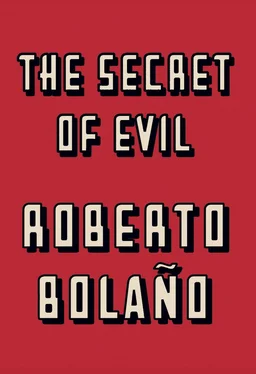Nobody answers.
Belano goes back down the stairs. He finds a hotel nearby, without having to leave Colonia Cuauhtémoc. He sits on the bed for a long time, watching Mexican television and letting his mind go blank. Not a single show is familiar, but somehow the old shows infiltrate the new ones, and Belano has the impression that he can see the face of El Loco Valdés on the screen or hear his voice. Later, channel surfing, he comes across a Tin-Tan movie and watches to the end. Tin-Tan was El Loco’s elder brother. He was already dead when Belano came to live in Mexico. El Loco Valdés might be dead now too.
When the movie’s over, Belano takes a shower and then, without even drying himself, he calls a friend. No one’s home. Just the answering machine, but Belano doesn’t want to leave a message.
He hangs up. He gets dressed. He goes to the window and looks out at Calle Río Panuco. He doesn’t see people or cars or trees, only the gray pavement and a calm that has something timeless about it. Then a boy appears, walking down the opposite sidewalk with a young woman who might be his big sister or his mother. Belano shuts his eyes.
He isn’t hungry, he isn’t sleepy, he doesn’t feel like going out. So he sits down on the bed again and goes on watching television, smoking one cigarette after another, until he finishes the pack. Then he puts on his black leather jacket and goes out into the street.
Irresistibly, the way a hit song keeps playing in your head, he finds himself returning to Ulises Lima’s apartment.
The sun is beginning to set over Mexico City when, after a series of fruitless attempts, Belano succeeds in getting someone in the building to buzz him through the street door. I must be going crazy, he thinks, as he climbs the stairs two by two. Nothing’s affecting me: the altitude, not having eaten, being alone in Mexico City. For a few interminable and, in their way, happy seconds, he stands in front of Ulises’s door without ringing. Then he presses the button three times. As he is turning to go, about to leave the building (though not for the last time, he knows that), the door of the adjacent apartment opens and an enormous, hairless, coppery head, on which slashes of red can be dimly made out (as if the possessor of the head had been painting a wall or a ceiling), emerges and asks him who he’s looking for.
At first, Belano doesn’t know what to say. There’s no point saying he’s looking for Ulises Lima, and he can’t be bothered making something up, so he keeps quiet and looks at his interlocutor: the head belongs to a young man, he wouldn’t be more than twenty-five, and from his expression Belano guesses that he’s annoyed or lives in a permanent state of annoyance. It’s empty, that place, says the young man. I know, says Belano. So what are you ringing for, idiot? says the young man. Belano looks him in the eye and says nothing. The door opens and the hairless young man comes out into the corridor. He’s fat, and all he’s wearing is a pair of baggy jeans held up by an old belt. The buckle, partly hidden by the young man’s belly, is large and made of metal. Is he coming out to hit me? wonders Belano. For a moment they examine each other. Our hero Arturo Belano, dear readers, is forty-six by this stage, and as you all know, or should know, his liver, his pancreas and even his colon are in a bad way, but he still knows how to box, and he’s sizing up the voluminous figure in front of him. When he lived in Mexico he got into plenty of fights and never lost, though it’s hard to credit now. Schoolyard scraps and barroom brawls. Belano looks at the fat guy, trying to figure out when to attack, when to hit him and where. But the fat guy just stares at Belano and looks back into his apartment, and then another young man appears, wearing a brown sweatshirt with a transfer on it that shows three men striking defiant poses in the middle of a street full of trash, and “Los Amos del Barrio” written in red letters at the top.
Belano is momentarily hypnotized by the design. Those pathetic-looking guys on the sweatshirt seem familiar. Or maybe not. Maybe it’s the street that seems familiar. I’ve been there, years ago, he thinks, years ago I walked down that street, with time on my hands, just looking around.
The guy in the sweatshirt, who’s almost as fat as the other one, asks Belano something in a voice that sounds like water boiling. Belano doesn’t understand. But it wasn’t an aggressive question, he’s sure of that. What? he asks. Are you a fan of Los Amos del Barrio? repeats the fat guy in the sweatshirt.
Belano smiles. No, I’m not from here, he says.
Then the second fat guy is pushed aside and a third fat guy appears; he’s very dark, an Aztec kind of fat guy with a little moustache, and he asks his roommates what’s going on. Three against one, thinks Belano, time to go. The fat guy with the little moustache looks at him and asks what he wants. This jerk was ringing the bell at Ulises Lima’s place, says the first fat guy. Did you know Ulises Lima? asks the fat guy with the little moustache. Yes, says Belano, I was a friend of his. And what’s your name, jerk? asks the fat guy in the sweatshirt. Arturo Belano says his name and then adds that he’ll be on his way, he’s sorry to have bothered them, but now the three fat guys are looking at him with real interest, as if they were seeing him from a different point of view, and the fat guy in the sweatshirt smiles and says, Cut the bullshit, your name can’t be Arturo Belano, though from the way he says it, Belano can tell that although he’s unconvinced, he’d like to believe it’s true.
Then he sees himself — and it’s as if he’s watching a movie, a movie so sad he’d never go to see it — in the fat guys’ apartment, and they’re offering their guest a beer. No thanks, I don’t drink any more, he says, sitting in a rickety armchair, its cloth cover printed with wilting flowers, holding a glass of water he can’t bring himself to drink from, because the water in Mexico City, so he’s been warned, though in fact he’s always known this, can give you gastroenteritis, while the fat guys settle down in the surrounding armchairs, except for the one without a shirt, who sits on the floor, as if he’s afraid the other chair might break under his weight or afraid of how his friends might react if it did.
The fat guy without a shirt is behaving a bit like a slave, Belano thinks.
What happens next is chaotic and sentimental: the fat guys inform him that they were the last disciples of Ulises Lima (that’s the word they use: disciples ). They tell Belano about his death, how he was run down by a mysterious car, a black Impala, and they talk about his life, a succession of legendary drinking bouts, as if the bars and rooms where Ulises Lima got sick and threw up were the successive volumes of his complete works. But mainly they talk about themselves: they have a rock group called El Ojete de Morelos and they perform in discos in the suburbs of Mexico City. They’ve made a record, which the official radio stations won’t touch because of the lyrics. But the little stations play their songs all day long. We’re getting famous, they say, but we’re still rebels. The way of Ulises Lima, they say, Ulises Lima’s tracer fire, the poetry of Mexico’s greatest poet.
As good as their word, they put on a CD of their songs, and Belano sits there motionless, listening, with his hand clamped around the glass of water he still hasn’t sipped from, looking at the dirty floor and the walls covered with posters for Los Amos del Barrio and El Ojete de Morelos and other bands he’s never heard of, maybe they’re earlier groups, whose members went on to form Los Amos and El Ojete: Mexican kids staring out at him from photos or from hell, holding their electric guitars as if they were brandishing weapons or freezing to death.
Читать дальше












